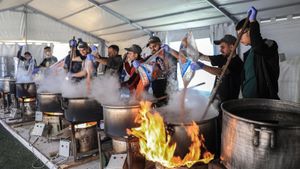The renowned anti-apartheid writer and activist Breyten Breytenbach has passed away at the age of 85, as confirmed by his family. He died peacefully in his sleep, with his wife Yolande at his side, in Paris.
Breytenbach, whose life was marked by artistic brilliance and fierce opposition to apartheid, left behind both poetry and paintings as legacies of his commitment to human rights. His family released a heartfelt statement describing him as "an immense artist, militant against apartheid, [who] fought for abetter world until the end." The global recognition of his contributions was reflected when he was humorously dubbed "the only nice South African" by the British puppet satire show Spitting Image, during some of South Africa's darkest times.
Born on September 16, 1939, in the Western Cape, Breytenbach's early artistic endeavors began at the University of Cape Town. He became involved with the Sestigers, a group of Afrikaans writers dedicated to showcasing the beauty of their language, all the whilst critiquing the racist apartheid regime. Although Afrikaans, which has Dutch roots, was heavily associated with the oppressive policies of the apartheid regime during this time, Breytenbach rejected its use as part of his political identity. He once stated, "I'd never reject Afrikaans as a language, but I reject it as part of the Afrikaner political identity. I no longerconsider myself an Afrikaner." This sentiment symbolized his struggle against the segregationist ideologies of his homeland.
His move to self-imposed exile began in 1960, as he left South Africa, primarily living across Europe. Nevertheless, he remained vocal against the apartheid regime, utilizing his platform to raise awareness of the injustices at home. Breytenbach initially worked in London before relocating to France, where he eventually settled with his wife, Yolande Ngo Thi Hoang Lien, originally from Vietnam. Their interracial marriage faced fierce opposition; Yolande was denied entry to South Africa due to the apartheid regime's laws against non-white individuals seeking to immigrate.
At the height of his literary fame, Breytenbach made the daring decision to return clandestinely to South Africa in 1975 to aid resistance groups. Unfortunately, his efforts landed him behind bars, and he was sentenced to seven years for terrorism. His time incarcerated did not stifle his creativity; he continued to write poetry, crafting some of his most incisive work even from the confines of his cell. His release was negotiated by then-French President François Mitterrand, allowing Breytenbach to become a French citizen.
After his release from prison, Breytenbach continued to produce literary and artistic works, culminating in one of his notable novels, The True Confessions ofan Albino Terrorist. This work detailed his harrowing experiences during his seven years behind bars, two of which he spent completely isolated. Following the fall of apartheid and the rise of Nelson Mandela’s government, Breytenbach did not shy away from making his discontent known. He became increasingly vocal about his beliefthat the African National Congress (ANC) had strayed from its ideals, describing it as having metamorphosedintoa "corrupt organization".
Breytenbach was not just passionate about justice within South Africa. He also extended his critique globally; for example, he penned an open letter published by The Guardian in 2002 addressed to Israeli Prime Minister Ariel Sharon. He wrote critically about the Israeli-Palestinian conflict, stating, "Why should we look the other way when it is Israel committing crimes? A viable state cannot be built on the expulsion of another people who have as much claim tothat territory as you have." This mirrored the stance he often took throughout his career, continually advocating for those disenfranchised by power wills.
With over 50 publications to his name, many of Breytenbach’s works have been translated widely, making his voice accessible to readers around the world. His artistic endeavors extended to visually capturing theworld, resultingin surreal paintings often depicting themes of captivity and the conflict between humanity and nature. His contributions to literature and art earned him accolades, including being madea Knight of the Order of Arts and Letters, one of France's highest cultural honors.
Breytenbach’s impact resonates deeply within South African culture and politics, and he leaves behind his wife Yolande, daughter Daphnée, and two grandsons. His unique voice will forever echo the struggles against oppression and the unending quest for freedom.
Many from across the globe and related fields are mourning his departure, paying tribute to this indomitable spirit who fought for justice throughwords and art. His legacy reminds us not just of his life and achievements, but also of the continual struggle for human rights around the world, ensuring his voice echoes long after his final breath.
Breytenbach's story is not just one of artistic achievement and activism; it embodies the heart of the fight against oppression, reminding us of the power of the human spirit to stand firm against tyranny. His life's work and legacy will undoubtedly inspire future generations to continue advocating for justice and equality, exemplifying the age-old adage about the pen being mightier than the sword.



